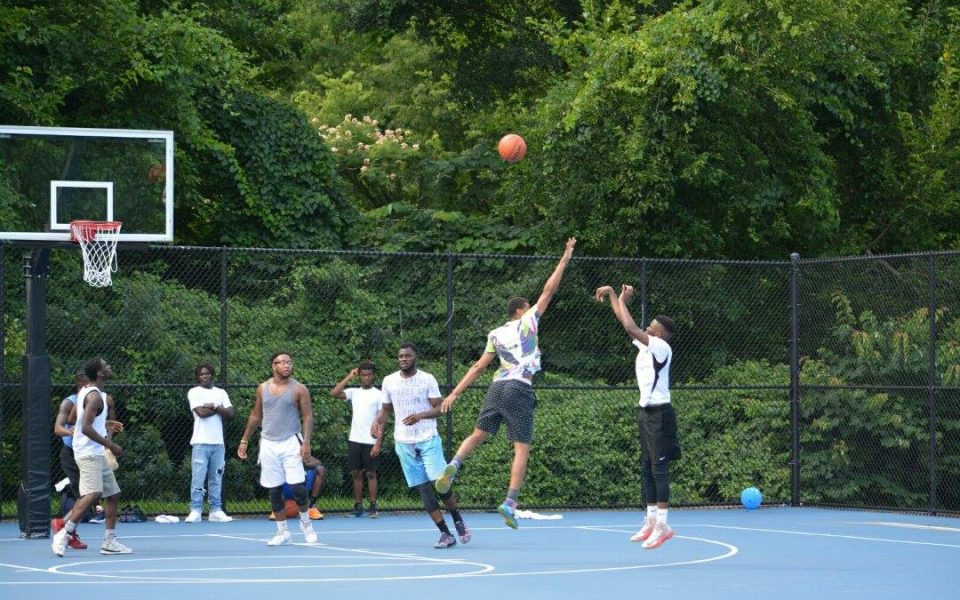Like so many others on Independence Day, Bobby Sarteh’s shirt sported a flag with recognizable red and white stripes, and a starry blue corner to boot. But despite the July 4 holiday, Sarteh donned the Liberian flag — which is very similar to the American stars & stripes — on his shirt, and a hat reading “Liberia” to match it.
Sarteh posed for a picture in front of a tall red, white and blue banner that hung from a chain-link fence. While his shirt might’ve read “God bless Liberia,” he smiled as he held a small plastic wand trumpeting three letters from its tip: “USA.”
Therein lies the duality that many of the day’s participants embodied, and embraced.

At Jalloh’s Upright Services’ Immigrant Youth Festival, intersections of the United States and other nationalities abounded. In fact, the event took place in order to bring together and celebrate those crossroads of cultural traditions that dominate the lives of many in Greensboro.
All around the outdoor-court area near Walker Avenue on UNCG’s campus, common July 4 traditions coupled with international ones: Nigerian music boomed from the DJ’s speakers, though many of the songs were in English, and dozens of hot dogs crisped on the grill, while traditional African dishes of plantains and jollof rice steamed nearby.
Sport bridged the traditions, too.
Months before, Anthony Fannoh III, who works with the African Youth Initiation and NC A&T University’s African Aggies Coalition, came to Franca Jalloh — founder and director of Jalloh’s Upright Services of NC — with an idea. The nonprofit aiming to support and empower low-income immigrant families offers assistance in English, reading and writing, citizenship, adult education, affordable housing and other means by which to navigate a foreign and challenging US system. As Jalloh’s event provided an opportunity to learn more about the United States while raising funds to help sponsor some immigrant families in need, Fannoh wanted to use sport for a similar purpose.
“[I thought]: Let’s do something out of the norm,” Fannoh recalled in an interview at the event, referring to the popular game of soccer. “Let’s do basketball.”
With Fannoh and a couple others at the helm, the Immigrant Youth Festival’s main event was a 3-on-3 basketball tournament. A few dozen young men from around North Carolina, most of them immigrants or refugees, contributed $50 per team to participate.
Though soccer might eclipse basketball for many, strong drives to the hoop, accurate shots from well behind the arc and merciless rejections at the rim proved that basketball wasn’t too far out of the norm for some of the players.
The games combined contentious outbursts (“You slapped my face!” “You slapped your own face!”) with the ease and humor of the event’s convivial spirit. The first “referee” — clearly a hapless companion assigned to mediate the early games — stood under the goal, wholly occupied by matters on his phone. A score of players waiting for their round to begin chided him at every ignored collision of players.
“For the third time,” the young ref pronounced, addressing a burst of disapproval yet still not looking up from his phone. “You call your own fouls!”

Many displaced people look to sports as a way to turn their heads homeward — a means of revisiting a previous life and of maintaining a tradition. Yet sometimes sports for refugees and immigrants can play the role of connecting with a new place and forming new traditions.
“[African refugees and immigrants] have an idea of what basketball is, but not the concept of it,” Eddie Boye — one of the tournament’s organizers — said between games. “It exposes them to new experiences. They can say, ‘I’m a little bit American now.’”
Given the political climate currently encroaching on the lives of many immigrants and refugees, patriotism and a celebration of the United States can be complex. According to Jalloh, it’s a tradition in which many have never engaged.
“[Some community members] have not celebrated independence in this country ever, and they’ve been here 20 or 30 years,” Jalloh explained. “They’ve looked out their window and seen fireworks and that’s it.”
But Jalloh, an immigrant herself, hoped the event could embolden those around her.
“[The event was] a strong, loud message that immigrants are here to stay,” she said. “Accept us with our accents, accept us with our different cultural backgrounds, and we’re going to celebrate this country that we’re a part of.”

©
Join the First Amendment Society, a membership that goes directly to funding TCB‘s newsroom.
We believe that reporting can save the world.
The TCB First Amendment Society recognizes the vital role of a free, unfettered press with a bundling of local experiences designed to build community, and unique engagements with our newsroom that will help you understand, and shape, local journalism’s critical role in uplifting the people in our cities.
All revenue goes directly into the newsroom as reporters’ salaries and freelance commissions.


Ugh. Wasn’t Liberia created by us for freed slaves? Why are they coming back now.